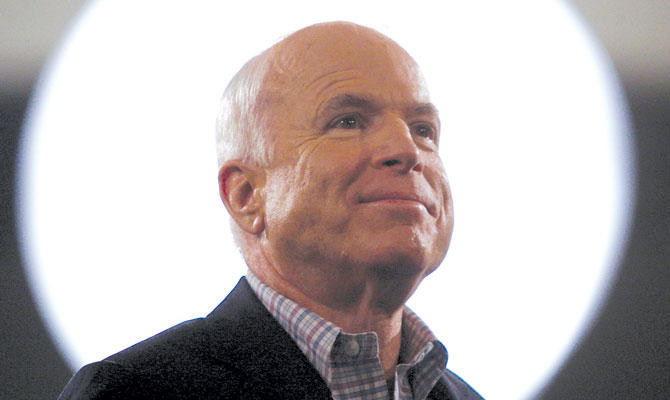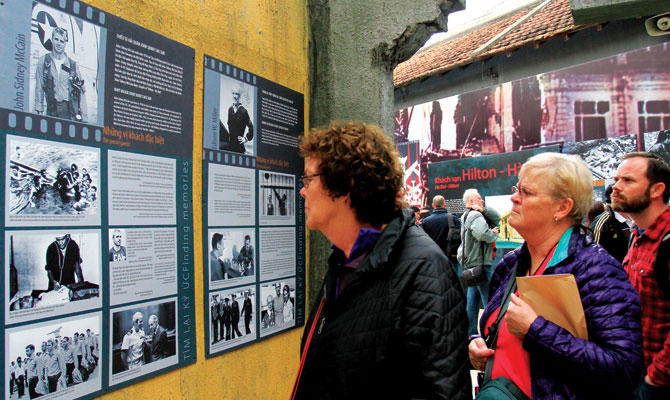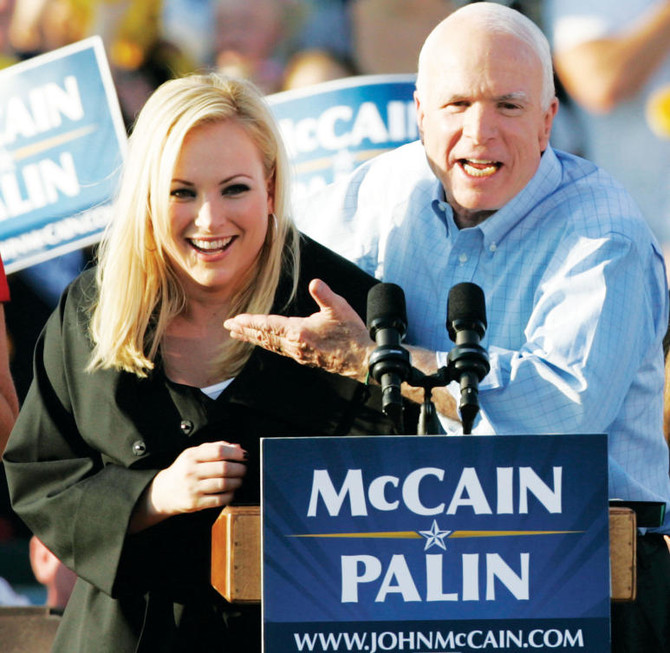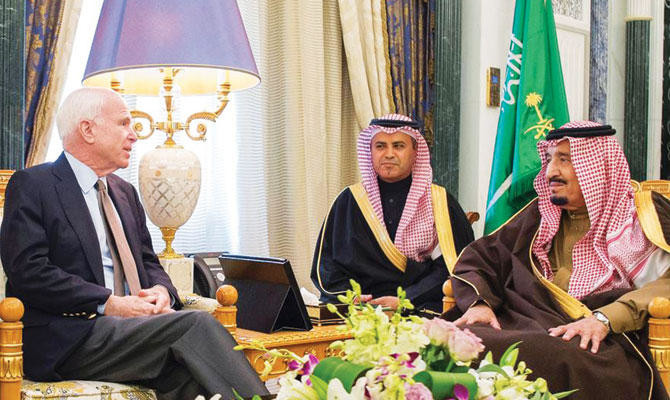DUBAI: An American voice for many countries across the Gulf and a friend of the region, US Senator John McCain, who died on Saturday at the age of 81, was remembered as a beacon of hope in US-Gulf relations.
From Saudi Arabia to the UAE, McCain paid a number of visits to the region, where prominent figures recognized him for his work to improving security, stability and mutual relationships.
After 60 years serving his country, McCain, the former presidential candidate died at his home in Cornville, Arizona. McCain was diagnosed with brain cancer in July 2017 and underwent brain surgery. Although a survivor of previous cancers, his family announced on Aug. 24 that he would no longer be receiving treatment for his illness.
Officials were quick to pay their respects by taking to Twitter to offer their condolences. Saudi Arabia’s Ambassador to the US, Prince Khalid bin Salman, tweeted: “Sincerest condolences to the American people on the loss of John McCain, an American hero who dedicated his life to serving his country and advancing global peace and security. He was a great friend of the Kingdom, a truly respected and trustworthy statesman. We will miss him.”
McCain’s office issued a statement that he had died at 4:28 p.m. with his wife Cindy and his family by his side.
His wife tweeted on Sunday: “My heart is broken. I am so lucky to have lived the adventure of loving this incredible man for 38 years. He passed the way he lived, on his own terms, surrounded by the people he loved, in the place he loved best.”
McCain was a former prisoner of war in Vietnam who ran for the Republican nomination for the presidency in 2000, but lost to George W. Bush. In 2008, he was the Republican presidential candidate who lost to Democrat Barack Obama.
A senator for Arizona for more than 30 years, he was a strong critic of US President Donald Trump, who also tweeted: “My deepest sympathies and respect go out to the family of Senator John McCain. Our hearts and prayers are with you.”
McCain was considered a friend of Saudi Arabia and the Arab world at large. In 2015, he visited the Kingdom as part of a regional tour focused on training Syrian rebels.
“Throughout his career, Senator John McCain was a true friend of Saudi Arabia,” said Fahad Nazer, a fellow at the National Council on US Arab Relations. “He understood and appreciated the importance of strong US-Saudi relations for the security and prosperity of both nations.”
Nazer said McCain’s support for the Kingdom’s special partnership with the US never wavered. “In recognition, he was given a special award at the Saudi-US partnership dinner that was organized when Crown Prince Mohammed bin Salman visited Washington this spring. His colleague and friend, Senator Lindsey Graham, accepted the award on his behalf.”
Later on, in February last year, McCain visited Riyadh to hold talks with King Salman. They discussed ways to strengthen US-Saudi relations. “McCain was a well-known veteran politician in American and international politics, who worked on military as well as political affairs, particularly in US domestic policy,” said Salem Alyami, political analyst and former adviser at the Saudi Ministry of Foreign Affairs.
“With regards to the Middle East, and during the past three decades, he had a powerful presence as one of the elements influencing US policy towards the region. I believe that there will be special sadness and mourning for him in Saudi Arabia because his death means the great loss of a man who worked with Saudis on various matters.”
Despite his waning influence on US and foreign policy after the formation of the Trump administration, McCain will remain an influential figure in the US and the rest of the world, Alyami said.
In 2017, McCain twice visited the UAE, where he discussed regional and international developments with Sheikh Mohammed bin Zayed, Crown Prince of Abu Dhabi and Deputy Supreme Commander of the UAE Armed Forces.
On Sunday, Sheikh Mohammed tweeted that the US had lost one of its most prominent and respected activists. “We shared a long friendship and worked together to strengthen bilateral cooperation. My sincere condolences to his family, friends and the American people.”
Flags were flying at half-staff at the White House on Sunday morning after officials expressed their sympathies. “Keeping Senator John McCain and his family in our thoughts and prayers,” tweeted Heather Nauert, spokesperson at the US State Department. “His spirit continues to inspire.”
Former US president Barack Obama and his wife, Michelle, also offered their condolences. “Few of us have been tested the way John once was, or required to show the kind of courage that he did. But all of us can aspire to the courage to put the greater good above our own. At John’s best, he showed us what that means. And for that, we are all in his debt.”
Other officials joined in, with Scott Morrison, Australia’s prime minister, calling McCain “a true friend of Australia who was committed to strengthening the alliance between our two nations. He was a man of great courage and conviction.”
 In the UK, Prime Minister Theresa May referred to McCain as “a great statesman” who embodied the idea of service over self. “It was an honour to call him a friend of the UK,” she said.
In the UK, Prime Minister Theresa May referred to McCain as “a great statesman” who embodied the idea of service over self. “It was an honour to call him a friend of the UK,” she said.
French President Emmanuel Macron also paid tribute to McCain, calling him “a true American hero. He devoted his entire life to his country. His voice will be missed.”
McCain started his military career training to become a naval pilot. He completed flight school in 1960 and became a pilot of ground-attack aircraft. He became a lieutenant commander and was awarded the Navy Commendation Medal and the Bronze Star Medal for missions flown over North Vietnam, where he was shot down and spent five years as a prisoner of war. He retired from the navy in 1981.
In 1987, he began his political career and was a member of the Armed Services Committee. He later became a senator, from 2000 to 2008.
Secretary of Defense James Mattis issued a statement following McCain’s death, stating: “We have lost a man who steadfastly represented the best ideals of our country. As a naval officer and defiant prisoner of war, John McCain stood with his brothers-in-arms until they returned home together.”
McCain will receive a full-dress funeral service at the Washington National Cathedral, where US Vice President Mike Pence is expected to represent the current administration, before being buried in Annapolis, Maryland.




















